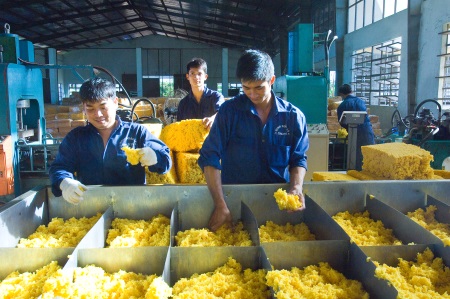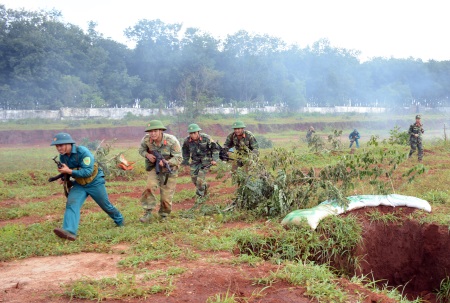The Corps 15 proactively reorganizes its structure and enhances the effectiveness of its production and business
Grasping resolutions and directives by the Central Military Commission (CMC) and the Ministry of National Defence (MND), particularly the Project No.80 on “restructuring, renewing, and enhancing the effectiveness of military-run enterprises towards 2020,” the Corps 15 has been actively taking specific steps towards the increased effectiveness of its production and business in line with the military-defence task in its area.
The Corps 15 is tasked with taking part in economic development associated with defence, security, and social consolidation in the Central Highlands’ strategic area. Over the past 34 years of construction and development, generations of the Corps’ cadres, soldiers, and workers have promoted the virtues of Uncle Ho’s soldiers, fulfilled the function as an “army ready for work and production,” proactively overcome all difficulties, and accomplished their assigned task, thereby contributing to developing the Central Highlands comprehensively in the political, economical, social, cultural, defence, and security fields.
 |
| Rubber processing |
Following the guidelines by the CMC and MND on rearranging, renewing, and enhancing the effectiveness of military-run enterprises, the Corps has actively developed the Project on restructuring the Corporation 15 and settling its financial problems and submitted the Project to leaders of the MND and relevant competent offices for approval. According to the Project, the Corps will organize its affiliated units into economic-defence units in the areas of Gia Lai and Kon Tum provinces. In reference to the settlement of financial problems and the restructuring of its land, it will transfer domestic plantations whose economic value is greater than their military-defence value with a view to creating financial resources for its payments, including those for its workers. It will transfer the plantations in the border communes to its economic-defence units to assign to the people and the households whose members work for the Corps in order to ensure production, employment, the people’s income, and political stability in the border areas. At the same time, it will hand over facilities (roads, irrigation constructions, infirmaries, schools, processing establishments) as well as mass organizations and residential areas of the Corps’ cadres and workers to localities, while implementing the policy for abundant labourers, particularly the ethnic minority ones properly after the transfer of plantations.
Apart from the Project on its restructuring and the settlement of its financial problems, in order to maintain its production and business, the Corps proactively adjusts, supplements, and issues a number of documents on regulations for internal management, focuses its investments on the key constructions, and enhances the work of inspection and supervision to prevent wastefulness in its investments and ensures the quality of its constructions. At the same time, it promotes training courses to improve the professional competence and working skills of its staff members, particularly the ethnic minority ones in planting rubber trees and processing rubber; reviews, stabilizes, and makes its organizational structure compact and proper; enhances the capability in business management; encourages the training and retraining of its managers and cadres in line with the conditions of market economy and international integration.
However, due to the large area under the Corps’ management with the complex developments of political security and social safety as well as a large number of its ethnic minority workers, it will be confronted with difficulties in operations under the new mechanism. Previously, the Corps was tasked with organizing production and using its forces to establish residential areas and build local facilities associated with cooperating with local party committees and authorities in forming up the postures within the defensive zones, with communes playing the central role in integrating other components into the general posture, thereby creating the synergy of the all-people national defence, particularly the on-spot strength and potential under the motto that “villages protect villages, districts protect districts, and provinces protect provinces” in peacetime. Up to now, in addition to expanding its production, the Corps has managed to establish 225 residential areas and 9 clusters of residential areas, especially in the border areas of Gia Lai and Kon Tum provinces as well as build facilities (electricity network, schools, and infirmaries) to serve the people and workers’ life. This acts as an important component of the defensive zone posture in the border lines. With the policy on the restructuring, the area of production land will be narrowed, and the building of residential areas and facilities will be assigned to localities or non-military enterprises. Thus, the Corps will face a lot of difficulties in cooperating with localities and other forces in building the defensive zones’ potential and postures as well as in grasping the people’s situation and managing the residential areas in the border lines.
To surmount those difficulties, fulfil the assigned task, and especially effectively implement the Project on restructuring the Corps and enhancing the effectiveness of its production and business in line with the military-defence task, in the upcoming time, its cadres, soldiers, and workers should focus on the main measures as follows.
1. Rendering cadres, soldiers, and defence employees fully aware of the guidelines and policy by the Party, State, CMC, and MND on restructuring military-run enterprises as an indispensable task during the process of economic restructuring; raising their awareness and responsibility towards the restructuring and renewing of military-rune enterprises. At the same time, it is necessary to emphasize that it is a major policy by the Party and State that is being realized within the Military. Therefore, party committees and commands of the Corps’ offices and units should adopt scientific, proper measures for stepping up the work of education and propagation to orientate the ideology of cadres, party members, and workers and make them clearly understand the role and necessity of restructuring the enterprises. Doing so will enable cadres, party members, and workers to comply with the deployment, arrangement, and assignment by all-level party committees and commands as well as the Party’s guidelines, the State’s policy and law, and directives, regulations, and guidance by the CMC and MND. Besides, it is important to closely cooperate with local party committees, authorities, and politico-social organizations to conduct the work of propagation widely among the people in order to achieve the people and localities’ consensus and support and contribute to maintaining political security and social order and safety in the area.
 |
| An exercise by the self-defence force |
2. Proactively consolidating party committees, party organizations, and mass organizations in line with a contingent of cadres under the preset plan for reorganizing the structure of offices and units and opportunely implementing the policy for discharged cadres, soldiers, and defence employees. When transferring clusters of residential areas, traffic roads, electricity networks, reservoirs, infirmaries, kindergartens, and plantations to localities, units should focus on creating the employments for their workers and ensuring their social welfare, life, and accommodations in accordance with the localities’ plans for socio-economic development and defensive zones, maintaining political security and social safety, and achieving the long-term defence-security goals of building the all-people national defence posture and defending the Homeland. In addition, units should recommend localities to receive teachers of kindergartens and medical staff members and implement the policy for them in order to maintain the system of kindergartens and infirmaries and provide education and health services for ethnic minority children and the people in the areas. Due regard should be paid to cooperating with localities and the forces stationed in the areas in well performing the work of mass mobilization, giving technical instructions to the people, improving the mental and material life of the people, particularly the ethnic minority people, and actively taking part in building strong political bases at grass-roots level.
3. Continuing to build the all-people national defence posture associated with the people’s security posture in the areas. In the medium term, it is essential to consolidate the organizational structure of the self-defence force properly, particularly the units in the border areas, and train this force under the MND’s program. This force both performs their duty under the Law on the Militia and Self-Defence Force and protects the production establishments and areas. It is also the main force of the Corps taking part in exercises, dealing with the situations to defend the border, and engaging in the defensive zones’ operations. Besides, it closely cooperates with the Military, Public Security, Border Guard, and Ranger Forces as well as other forces in protecting the forests and taking part in natural disaster, fire and explosion prevention and control and search and rescue, thereby making contributions to consolidating and building the all-people national defence posture in the area.
So far, the Corps has signed the Regulations on cooperation with the Military, Public Security, and Border Guard Forces and localities of Gia Lai and Kon Tum (Pleiku city and districts of Chu Prong, Duc Co, Ia Grai, Ia H’Drai, Sa Thay, and Ngoc Hoi). The cooperation has allowed the Corps and other forces to maintain security in the areas and border areas, particularly the posture of people’s hearts and minds. Under the Project on the restructuring, with a decrease in the number of its staff members, the Corps will have difficulties in cooperating with other forces and localities in grasping the situation, preparing the forces and projects to deal with situations as well as in maintaining political security and preventing the hostile forces’ operation throughout the border. Besides, the Corps’ domestic rubber plantations act as the buffer zones for the border areas, holding a position of utmost importance to the defensive plan and operations to defend the border; they are also the rest stop of those who cross the border and penetrate into our country.
The restructuring of the Corps represents a sound policy which should be closely, carefully directed and implemented. Thus, the Corps will attach importance to handling the issues on land and life of the ethnic minority workers. It will closely cooperate with local party committees and authorities and other forces in transferring the national defence land and changing the purpose of use of national defence land. Emphasis will be placed on dealing with the encroachment on national defence land under the law so as to achieve the consensus among the people. Concerning the task of production, most of the Corps’ plantations are located in the border areas where many ethnic minority people who are easily incited by the hostile forces live. As a result, the Corps will carry out a pilot project on aligning teams of production with communes, villages, and hamlets, draw lessons for the following steps, stabilize the ethnic minority people’s life as the target, and prevent the hostile forces from taking advantage of the issues on land and ethnicity to destabilize the situation in the area.
Sr. Col. Hoang Van Sy, Commander of the Corps